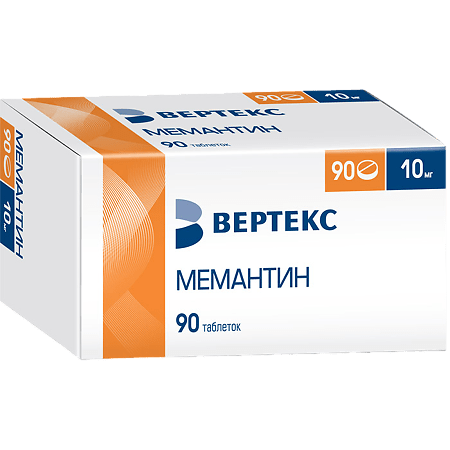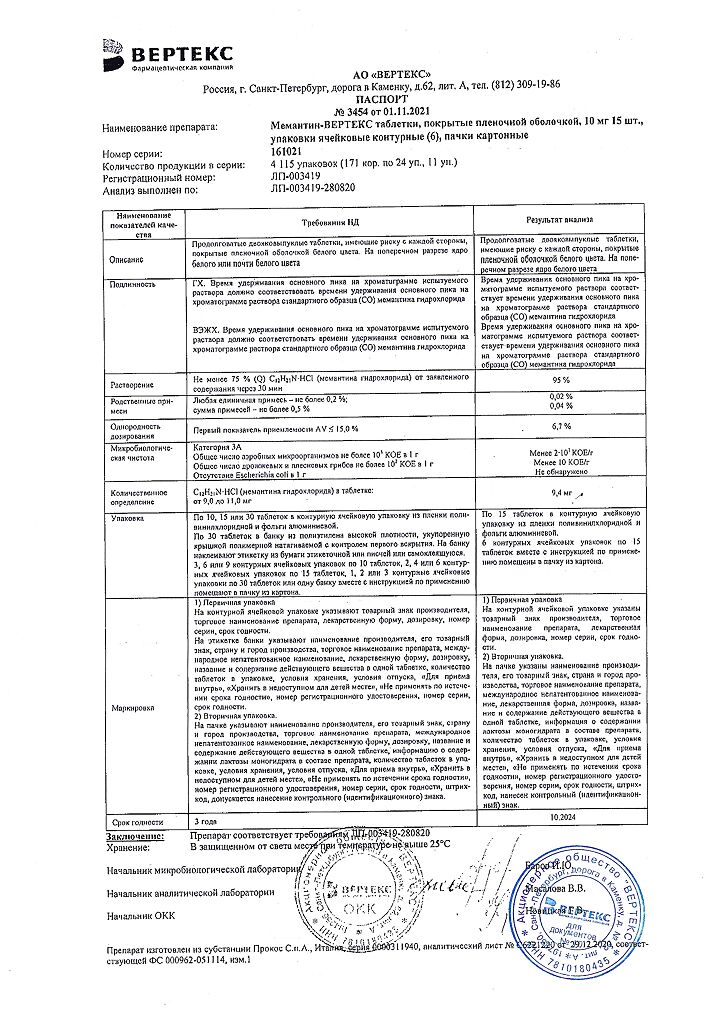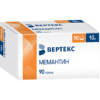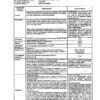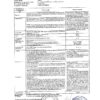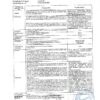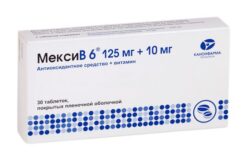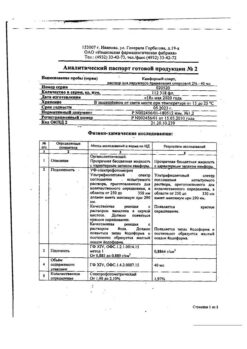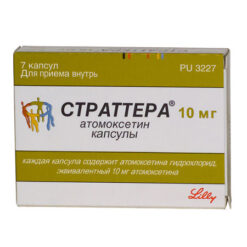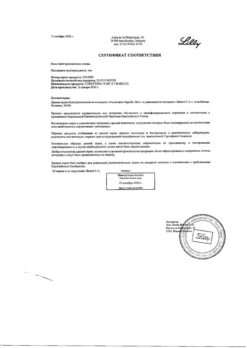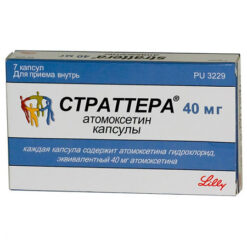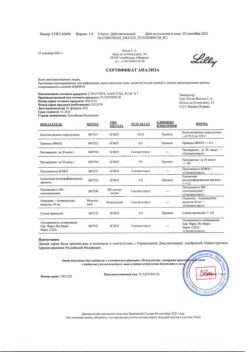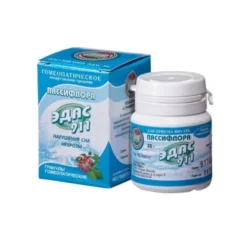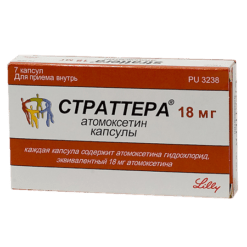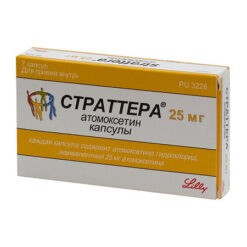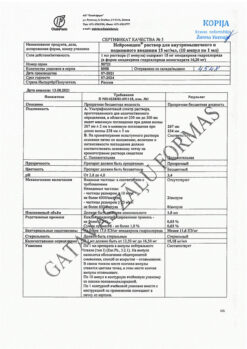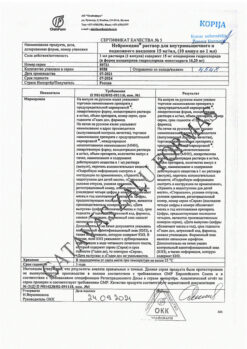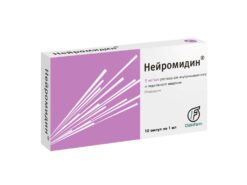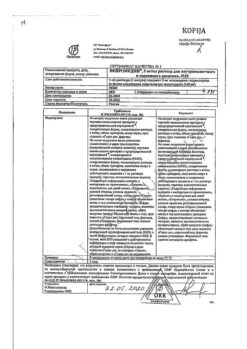No products in the cart.
Memantine-Vertex, 10 mg 90 pcs
€43.20 €37.44
Description
One film-coated tablet contains:
The dosage is 10 mg.
Active substance:
memantine hydrochloride – 10.0 mg;
Auxiliary substances:
Cellulose microcrystalline – 152.5 mg;
calcium hydrophosphate dihydrate – 50.0 mg;
croscarmellose sodium – 12.5 mg;
lactose monohydrate -10.0 mg;
Hyprolose (hydroxypropyl cellulose) – 5.0 mg;
Taalc, 5.0 mg;
Colloidal silicon dioxide – 2.5 mg;
Magnesium stearate – 2.5 mg;
Film coating:
.[hypromellose – 4,000 mg, hyprolose (hydroxypropyl cellulose) – 1,552 mg, talc – 1,568 mg, titanium dioxide – 0,880 mg] or [dry film coating mixture containing hypromellose (50%), hyprolose (hydroxypropyl cellulose) (19.4%), talc (19.6%), titanium dioxide (11%)] – 8.0 mg.
Indications
Indications
Moderate to severe dementia of the Alzheimer’s type.
Pharmacological effect
Pharmacological effect
One film-coated tablet contains:
Dosage 10 mg.
Active substance:
memantine hydrochloride – 10.0 mg;
Excipients:
microcrystalline cellulose – 152.5 mg;
calcium hydrogen phosphate dihydrate – 50.0 mg;
croscarmellose sodium – 12.5 mg;
lactose monohydrate -10.0 mg;
hyprolose (hydroxypropylcellulose) – 5.0 mg;
talc – 5.0 mg;
colloidal silicon dioxide – 2.5 mg;
magnesium stearate – 2.5 mg;
Film casing:
[hypromellose – 4.000 mg, hyprolose (hydroxypropyl cellulose) – 1.552 mg, talc – 1.568 mg, titanium dioxide – 0.880 mg] or [dry film coating mixture containing hypromellose (50%), hyprolose (hydroxypropyl cellulose) (19.4%), talc (19.6%), titanium dioxide (11%)] – 8.0 mg.
Special instructions
Special instructions
Patients with alkaline urine require more careful monitoring of such patients due to slower elimination of memantine. Factors that cause an increase in urine pH include: sudden changes in diet, for example, replacing a meat-rich diet with a vegetarian one or intensive use of alkaline gastric buffers. In addition, urine pH may increase due to renal tubular acidosis or severe urinary tract infection caused by Proteus bacteria.
Data on the use of memantine in patients with a history of myocardial infarction, chronic heart failure (NYHA functional class III-IV) or uncontrolled arterial hypertension are therefore necessary to carefully monitor such patients.
Use with caution in patients with thyrotoxicosis, epilepsy, seizures (including a history) and a predisposition to epilepsy.
Concomitant use of memantine and NMDA receptor antagonists such as amantadine, ketamine and dextromethorphan should be avoided. These compounds act on the same receptor system as memantine, and therefore adverse reactions (mainly from the central nervous system) may occur more frequently and be more severe.
The drug Memantine contains lactose monohydrate. Patients with hereditary galactose intolerance, lactase deficiency or glucose-galactose malabsorption should not take Memantine.
Impact on the ability to drive vehicles. Wed and fur.:
Patients with moderate to severe dementia of the Alzheimer’s type usually have impaired ability to drive vehicles and operate complex machinery. In addition, memantine may cause a change in the reaction rate, so patients should refrain from driving vehicles or operating complex machinery.
Active ingredient
Active ingredient
Memantine
Composition
Composition
One film-coated tablet contains:
Dosage 10 mg.
Active substance:
memantine hydrochloride – 10.0 mg;
Excipients:
microcrystalline cellulose – 152.5 mg;
calcium hydrogen phosphate dihydrate – 50.0 mg;
croscarmellose sodium – 12.5 mg;
lactose monohydrate -10.0 mg;
hyprolose (hydroxypropylcellulose) – 5.0 mg;
talc – 5.0 mg;
colloidal silicon dioxide – 2.5 mg;
magnesium stearate – 2.5 mg;
Film casing:
[hypromellose – 4.000 mg, hyprolose (hydroxypropyl cellulose) – 1.552 mg, talc – 1.568 mg, titanium dioxide – 0.880 mg] or [dry film coating mixture containing hypromellose (50%), hyprolose (hydroxypropyl cellulose) (19.4%), talc (19.6%), titanium dioxide (11%)] – 8.0 mg.
Pregnancy
Pregnancy
Pregnancy
Contraindications
Contraindications
– Hypersensitivity to memantine or any of the components included in the drug;
– severe liver failure (class C according to the Child-Pugh classification);
– lactose intolerance, lactase deficiency, glucose-galactose malabsorption syndrome;
– pregnancy;
– breastfeeding period;
– age under 18 years (efficacy and safety have not been established).
With caution:
– Thyrotoxicosis;
– epilepsy, predisposition to epilepsy;
– convulsions (including history);
– simultaneous use of NMDA receptor antagonists (amantadine, ketamine, dextromethorphan);
– the presence of factors that increase urine pH (sudden change of diet, for example, switching to a vegetarian diet, copious intake of alkaline gastric buffers);
– renal tubular acidosis;
– severe urinary tract infections caused by bacteria of the genus Proteus;
– myocardial infarction (history);
– heart failure (III-IV functional class according to the NYHA classification);
– uncontrolled arterial hypertension;
– renal failure;
– liver failure (class A and B according to the Child-Pugh classification).
Side Effects
Side Effects
Classification of the frequency of side effects according to the recommendations of the World Health Organization (WHO): very often >1/10; often from > 1/100 to 1/1000 to 1/10000 to < 1/1000; very rarely <1/10000, including isolated reports; frequency unknown - based on available data, it is not possible to determine the frequency of occurrence.
From the central nervous system:
often – headache, dizziness, drowsiness, imbalance;
uncommon – gait disturbance, confusion, hallucinations (hallucinations were observed mainly in patients with severe Alzheimer’s type dementia);
very rarely – convulsions;
frequency unknown – psychotic reactions, impaired consciousness, increased excitability, depression, anxiety, suicidal thoughts, increased intracranial pressure, muscle hypertonicity.
From the cardiovascular system:
often – increased blood pressure;
uncommon – venous thrombosis/thromboembolism, heart failure.
From the digestive system:
often – constipation;
infrequently – nausea, vomiting;
frequency unknown – pancreatitis, hepatitis.
From the respiratory system:
often – shortness of breath.
From the genitourinary system:
frequency unknown – acute renal failure, cystitis, increased libido.
Allergic reactions:
often – hypersensitivity to the components of the drug;
frequency unknown – allergic reactions, Stevens-Johnson syndrome.
From the skin:
frequency unknown – thrombocytopenic purpura.
Laboratory indicators:
often – increased activity of liver enzymes;
frequency unknown – agranulocytosis, leukopenia (including neutropenia), pancytopenia, thrombocytopenia.
Others:
infrequently – increased fatigue;
rarely – fungal infections; frequency unknown – candidiasis.
Interaction
Interaction
When memantine is used simultaneously with levodopa, dopamine receptor agonists, and anticholinergics, their effect may be enhanced.
When memantine is used simultaneously with barbiturates and antipsychotics, their effect may decrease.
When memantine is used simultaneously with dantrolene or baclofen, as well as with antispasmodics, their effect may change (increase or decrease), so the doses of the drugs should be selected individually.
Concomitant use of memantine with amantadine should be avoided due to the risk of developing psychosis. Both compounds are NMDA receptor antagonists.
The risk of developing psychosis is also increased when memantine is used concomitantly with phenytoin, ketamine and dextromethorphan.
With simultaneous use of memantine with cimetidine, ranitidine, procainamide, quinidine, quinine and nicotine, the risk of increasing the concentration of memantine in the blood plasma increases.
With the simultaneous use of memantine with hydrochlorothiazide, it is possible to reduce the concentration of hydrochlorothiazide in the blood plasma due to an increase in its excretion from the body.
The international normalized ratio (INR) may increase in patients taking concomitant oral indirect anticoagulants (warfarin). It is recommended to regularly monitor prothrombin time or INR in patients taking concomitant indirect anticoagulants.
Concomitant use of memantine with antidepressants, selective serotonin reuptake inhibitors and monoamine oxidase inhibitors requires careful monitoring of patients.
According to pharmacokinetic studies, no drug interaction effects were detected in young healthy volunteers with a single simultaneous dose of memantine with glibenclamide/metformin or donepezil.
Clinical studies also did not reveal the effect of memantine on the pharmacokinetics of galantamine in young healthy volunteers.
In in vitro studies, memantine did not inhibit CYP isoenzymes 1A2, 2A6, 2C9, 2D6, 2E1, 3A, flavin-containing monooxygenase, epoxide hydrolase, or sulfation. When memantine is used simultaneously with levodopa, dopamine receptor agonists, and anticholinergics, their effect may be enhanced.
When memantine is used simultaneously with barbiturates and antipsychotics, their effect may decrease.
When memantine is used simultaneously with dantrolene or baclofen, as well as with antispasmodics, their effect may change (increase or decrease), so the doses of the drugs should be selected individually.
Concomitant use of memantine with amantadine should be avoided due to the risk of developing psychosis. Both compounds are NMDA receptor antagonists.
The risk of developing psychosis is also increased when memantine is used concomitantly with phenytoin, ketamine and dextromethorphan.
With simultaneous use of memantine with cimetidine, ranitidine, procainamide, quinidine, quinine and nicotine, the risk of increasing the concentration of memantine in the blood plasma increases.
With the simultaneous use of memantine with hydrochlorothiazide, it is possible to reduce the concentration of hydrochlorothiazide in the blood plasma due to an increase in its excretion from the body.
The international normalized ratio (INR) may increase in patients taking concomitant oral indirect anticoagulants (warfarin). It is recommended to regularly monitor prothrombin time or INR in patients taking concomitant indirect anticoagulants.
Concomitant use of memantine with antidepressants, selective serotonin reuptake inhibitors and monoamine oxidase inhibitors requires careful monitoring of patients.
According to pharmacokinetic studies, no drug interaction effects were detected in young healthy volunteers with a single simultaneous dose of memantine with glibenclamide/metformin or donepezil.
Clinical studies also did not reveal the effect of memantine on the pharmacokinetics of galantamine in young healthy volunteers.
In in vitro studies, memantine did not inhibit CYP isoenzymes 1A2, 2A6, 2C9, 2D6, 2E1, 3A, flavin-containing monooxygenase, epoxide hydrolase, or sulfation.
Overdose
Overdose
There are limited data on overdose obtained from clinical studies and post-marketing surveillance.
Symptoms
Overdose when taking relatively large doses of memantine (200 mg once, or 105 mg per day for 3 days) is expressed by symptoms of fatigue, weakness and/or diarrhea or the absence of symptoms. Overdose when taking up to 140 mg of memantine once or an unknown amount of memantine is expressed by symptoms associated with the central nervous system (confusion, drowsiness, dizziness, vertigo, anxiety, agitation, hallucinations, gait disturbance) and/or gastrointestinal disorders (vomiting, diarrhea).
In the most serious cases of overdose, the patient survived after taking more than 2000 mg of memantine with adverse effects from the nervous system (coma for 10 days, later diplopia, agitation). The patient received symptomatic therapy and plasmapheresis and recovered without sequelae.
Another reported case of serious overdose was 400 mg of memantine as a single dose. The patient recovered without consequences. Adverse effects from the nervous system were noted: anxiety, psychosis, visual hallucinations, stupor, seizures, drowsiness, unconsciousness.
Treatment
Symptomatic therapy, gastric lavage, taking adsorbents (activated carbon), urine acidification, forced diuresis (if necessary). There is no specific antidote.
Recommendations for use
Recommendations for use
Memantine therapy should be initiated and administered under the supervision of a physician experienced in the diagnosis and treatment of dementia of the Alzheimer’s type. The diagnosis must be made in accordance with current guidelines.
Treatment should only be started if the patient’s caregiver regularly monitors the patient’s drug intake.
Tolerance and dosage of memantine should be regularly reviewed, preferably within the first three months after starting treatment. Thereafter, the clinical efficacy of memantine and patient tolerance to treatment should be reassessed according to current clinical guidelines.
Maintenance treatment can be continued indefinitely if there is a positive therapeutic effect and the drug is well tolerated. Memantine should be discontinued if there is no positive therapeutic effect or the patient is intolerant to the drug.
The drug should be taken orally once a day and always at the same time, regardless of meals. It is recommended to start treatment with memantine using the minimum effective dose.
Used during the 1st week of therapy (days 1-7) at a dose of 5 mg/day, during the 2nd week (days 8-14) at a dose of 10 mg/day, during the 3rd week (days 15-21) at a dose of 15 mg/day, starting from the 4th week – at a dose of 20 mg/day.
The recommended maintenance dose is 20 mg/day.
The maximum daily dose is 20 mg.
Special patient groups
Elderly patients (over 65 years old)
No dose adjustment is required.
Patients with impaired renal function
In patients with a creatinine clearance of 50-80 ml/min, no dose adjustment is required.
In patients with moderate renal failure (creatinine clearance 30-49 ml/min), the recommended daily dose is 10 mg. If this dose is well tolerated over 7 days, the dose can be increased to 20 mg/day in accordance with the standard regimen.
In patients with severe renal failure (creatinine clearance 5-29 ml/min), the daily dose should not exceed 10 mg.
Patients with liver dysfunction
In patients with mild to moderate liver dysfunction (Class A and B according to the Child-Pyot classification), no dose adjustment is required.
In patients with severe liver failure (class C according to the Child-Pugh classification), the use of the drug is contraindicated.
Storage conditions
Storage conditions
Store in a place protected from light, at a temperature not exceeding 25 °C.
Keep out of the reach of children.
Shelf life
Shelf life
Store in a place protected from light, at a temperature not exceeding 25 °C.
Keep out of the reach of children.
Manufacturer
Manufacturer
Vertex, Russia
Additional information
| Shelf life | Store in a dark place at a temperature not exceeding 25 °С. Keep out of reach of children. |
|---|---|
| Conditions of storage | Store in the dark place at a temperature not exceeding 25 °С. Store out of the reach of children. |
| Manufacturer | Vertex, Russia |
| Medication form | pills |
| Brand | Vertex |
Related products
Buy Memantine-Vertex, 10 mg 90 pcs with delivery to USA, UK, Europe and over 120 other countries.

